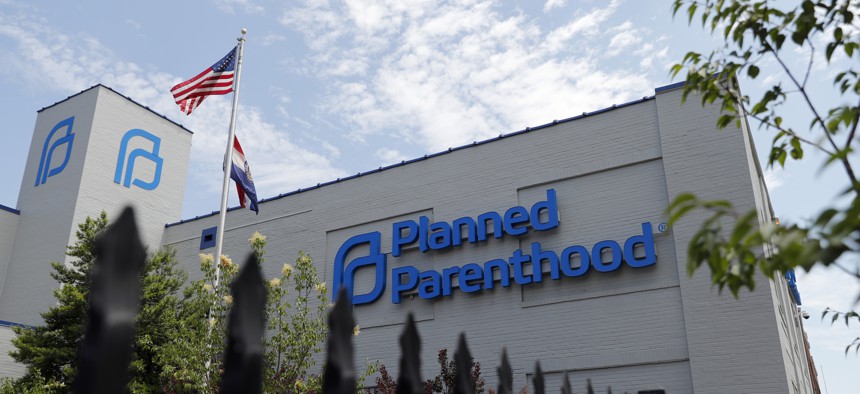‘We 100% Plan to Stay Open’: Abortion Providers Say They Will Continue Services During Pandemic

The Planned Parenthood in St. Louis is the only clinic in Missouri that offers abortion services. Some women will have to face the difficult choice of traveling long distances for reproductive healthcare during the Covid-19 pandemic. AP Photo/Jeff Roberson
Abortion clinics across the country are continuing to offer services, which providers call essential and time sensitive.
While hospitals and urgent care centers across the country brace themselves for an onslaught of patients seeking testing or treatment for the novel coronavirus, another segment of the health care field is preparing to continue as normal operations as possible.
Abortion providers say that unlike elective surgeries, which major medical organizations have urged hospitals to cancel so that staff can be fully devoted to coronavirus patients, women’s reproductive care can’t take place on a delayed schedule. Abortions are time sensitive for political reasons, as some states ban procedures as early as 20 weeks into a pregnancy, and health reasons, as some women have medical conditions that make continuing a pregnancy life-threatening.
Because of this, abortion clinics are sending a clear message: the doors will stay open unless they’re forced to close.
“Abortion is not something you can put off for a few months,” said Brigid Leahy, the senior director of public policy for Planned Parenthood Illinois. “We do not want to delay that care because the longer you delay, the more it increases risk and cost. It’s important that patients don’t postpone necessary healthcare.”
Clinics in Illinois and across the country are increasing the frequency of their disinfectant practices and conducting telephone screenings of patients, checking for any respiratory symptoms, a history of travel to infected areas or close contact with someone who has a suspected or confirmed case of Covid-19. They’re also encouraging patients to use online services like Planned Parenthood Direct for non-urgent needs, where they can order birth control or UTI treatments that will ship directly to their homes.
The National Abortion Federation has released additional guidelines for abortion providers, encouraging them to have patients fill out screening forms at home, space out patient scheduling, and to limit those in the waiting room to patients only.
In Ohio, where Gov. Mike DeWine was the first state leader to shut down schools, and then later was the first to close bars, restaurants, and other public gathering places, abortion clinics servicing the areas around Cleveland and Akron will also continue to see patients. “We 100% plan to stay open,” said Sherri Grossman, the executive director of the Northeast Ohio Women’s Center.
But Grossman and other providers said they are concerned about the host of ancillary challenges brought on by the pandemic that could compound the difficulty of obtaining an abortion. Public transit is running on a limited schedule in most places, service workers face impending layoffs and often lack sick leave, and child care is largely not available.
Grossman said the clinic may use its funds to ensure that those struggling with public closures can still access abortion services. “We have a number of patients who take public transportation,” she said. “We would certainly fund them to get a Lyft or Uber to our clinic now.”
So far, only one governor has explicitly stated that abortion clinics will not be subject to closure mandates or elective procedure cancellations. Massachusetts Gov. Charlie Baker on Sunday ordered hospitals and ambulatory surgical centers to cancel all elective medical procedures, and on Tuesday clarified that abortion is considered an essential medical service.
Dr. Dominika Seidman, a professor at the University of California, San Francisco, said that she would like to see more elected officials do the same. “It’s important to explicitly name abortion a non-elective procedure because there is so much in the media about ‘elective abortions,’” Seidman said. “There is no such thing as an elective abortion. Elective procedures can be postponed. The repercussions of postponing or not having an abortion are profound, especially during a pandemic when a pregnancy could become high risk if someone is infected with Covid.”
Seidman also runs Team Lily, a roving prenatal care program for pregnant people who have trouble getting to clinics, including those who are homeless, have substance use disorders, or deal with significant mental illness. She plans to continue visiting patients as more clinics shift to telehealth for non-critical needs, and is working to ensure that hospitals and clinics will accept referred patients for abortion if they need it.
Patients in places like the San Francisco Bay Area, which is currently under a “shelter in place” mandate, might still have an easier time accessing reproductive health services than people in other parts of the country. California is a state with relatively few restrictions on abortions. In other states, particularly those in the South and the Midwest, patients may have to appear for two appointments with a waiting period in between—a difficult task if they have to travel a long distance to an abortion clinic at a time when many hotels might be closed. In some states, abortions have to be performed in a hospital after a certain number of weeks—something that will become increasingly difficult to schedule as hospitals become overwhelmed with Covid-19 cases.
Leahy, from Planned Parenthood Illinois, said Illinois “is in a good place right now” since Gov. J.B. Pritzker last year signed into law a measure that made abortion a “fundamental right” for women in the state. But many neighboring states have moved in the opposite direction. “I feel for the people in Missouri where, with only one provider left, abortion is almost completely inaccessible,” Leahy said. “In a time where everyone should be staying at home, some women will face an incredibly tough choice to travel far away because they do not have a close option for the healthcare they need.”
Emma Coleman is the assistant editor for Route Fifty.
NEXT STORY: The digital divide leaves millions at a disadvantage during the coronavirus pandemic






